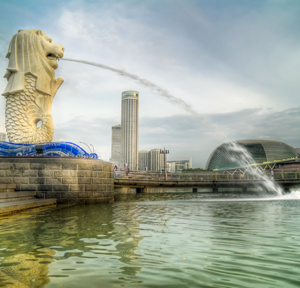Alt Investments
Singapore Attempts To Cool Property Market With Stamp Duty Hike

The Singaporean government has introduced its fifth round of measures to cool housing speculation, aimed primarily at discouraging foreign investors who consider Singapore a safe haven for their cash.
The
Singaporean government has introduced its fifth round of measures
to cool
housing speculation, aimed primarily at discouraging foreign
investors from using the city-state as a safe haven for their
cash.
The government has
imposed an additional buyer's stamp duty (ABSD), which is
assessed on top
of the existing buyer's stamp duty of around 3 per cent, to
try to discourage the swathes of foreign speculators looking for
low-risk and high yield. The share of residential properties
purchased by foreign investors rose to 19 per cent in the third
quarter of this year from 7 per cent in third quarter of 2009,
according to data from Barclays Capital.
The ABSD is
tiered for different groups of buyers. While foreign
purchasers and
corporate entities buying a first and subsequent residential
property in Singapore
will pay 10 per cent, permanent residents buying a second and
subsequent residential property in Singapore will pay an ABSD of
just three per
cent.
Born-and-bred Singaporeans buying a
third and subsequent residential property in Singapore will also
pay three per cent, said the government.
A necessary step
The move is not unanticipated.
Analysts at Barclays
Capital said they had expected another set of
cooling
measures, given that transactions and prices have remained
stubbornly high
despite four rounds of measures aimed at curbing property
speculation.
“More interestingly,
this is the first time the government is, firstly,
introducing tiered
measures tied to the residency status of the buyers, and
secondly, targeting excessive investment demand from
abroad. The previous
rounds of cooling measures have involved tweaking
loan-to-value ratios to
increase buyer prudence and raising the seller's stamp
duty to discourage short-term speculative purchases, all
without
discriminating between residents and foreign buyers,” said Barcap
analysts.
"We have
always had open markets and must keep them that way. The
additional buyer's stamp duty should help cool investment demand,
and avoid the prospect of a major, destabilising correction
further down the road. However, the reality is
that investment flows into our property market are now larger
than before, and
unlikely to recede as long as interest rates remain low,"
said
minister of finance and Monetary
Authority of Singapore chairman, Tharman
Shanmugaratnam.
Less competitive
Not everyone agrees. Camilla Dell, managing director and founder of London-based search firm Black Brick Property Solutions, believes the hike will inevitably damage foreign demand. “The rise in stamp duty will certainly put some buyers off purchasing property in Singapore. We are already starting to see an increase in the level of enquiries coming through from Asian investors and other overseas investors who were once considering investing into the Singapore property market, but are now changing their mind due to increases in tax," she said.
The issue is, Dell points out, it is not just stamp duty that hits investors in Singapore. There is also a sellers tax of between four per cent and 12 per cent depending on how long the property has been owned. A property must be owned for four years or longer to avoid having to pay sellers tax.
All of this makes Singapore less attractive for property investors, and London is bound to benefit as a result, where the tax system is far more favourable, particularly for overseas investors who pay no sellers tax or capital gains tax if they are a UK non-resident, giving them a tax break of 28 per cent. Stamp duty can also be significantly reduced in the UK if the property is owned in a company name, buyers pay very little or no tax on the acquisition.
Singapore has traditionally been a favourite destination of expats and its growing financial services industry has attracted scores of foreign professionals in recent years. A recent survey by HSBC Expat Explorer revealed that on the joint criteria of economics, quality of life and raising children, Singapore tops the ranks of expatriate locations. Also, excess liquidity triggered by additional monetary easing in developed economies is pouring into Singapore, which is widely regarded as a safe haven for money due to its advantageous tax system and stable political regime.
Foreign buying has pushed up
prices. Data shows that private residential prices have risen to
13 per cent
above the previous high in 1996, and 16 per cent above the more
recent peak in
mid-2008, according to Barcap. On a stock basis, the foreign
owners' share of the private residential market increased to
nearly a quarter as of end-September 2011 from a fifth at the
start of 2000.
Political motivation
Barcap analysts believe the dramatic move is more politically-loaded than other rounds of cooling. This round will have the most significant impact on house prices, which should in turn ensure greater housing affordability for Singaporeans - a key political issue since the elections in May 2011, said the bank.
Could the cooling measures mean a
slowing of demand or a price crash? Barcap analysts believe this
is unlikely,
although a gradual downward correction is more
probable, with the
government pulling back as much excess supply as possible and
reversing some of
the cooling measures should the need arise.
Singapore is not the only government to introduce measures to hold speculators at bay. Recently the Chinese government enforced laws that people buying their first property must use 50 per cent cash, while 100 per cent cash must be used on a second property.